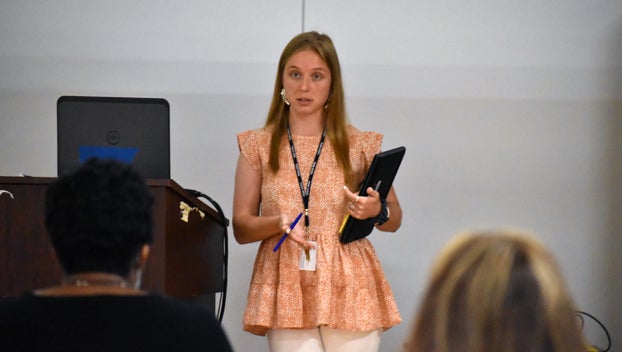Childcare providers express frustrations with remote learning
Published 6:32 pm Thursday, September 3, 2020

- TEACHING THE TOOLS: Eastern Elementary School first-grade teacher Angelica Kaledas shares a lesson with local childcare providers to help them navigate the school system’s remote learning tools. The training session also allowed providers to share some of their frustrations with the process. (Matt Debnam/Daily News)
|
Getting your Trinity Audio player ready...
|
To make remote learning work, it takes buy-in from teachers, parents and students, and local childcare providers are now taking on new roles as facilitators in that process. In doing so, they face the challenge of learning new technology and balancing parent and teacher expectations with caring for the developmental and emotional needs of children.
While parents received instruction about new online learning platforms during open house events at the various schools before the school year started, childcare providers did not. Recognizing that challenge, Eastern Elementary School organized a training session this week to bridge that gap.
“We’re here to do everything that we can to assist in any way we can,” said training facilitator Alicia Worsley. “I know the struggle. I see it when the children are on the screen and the frustrations that they have. It’s like their attention span is just not there. That was the whole point of me organizing this. The daycares are doing everything that they can, but they’re not understanding the steps to getting the kids on and doing exactly what they’re supposed to do.”
STUCK IN THE MIDDLE
While the training offered a chance to better understand technology, courtesy of a walkthrough by EES first-grade teacher Angelica Kaledas, it also evolved into an opportunity for childcare providers to express their frustrations to school system staff.
Among those frustrations were trying to manage large groups of students with varying schedules and teachers, while not always having the knowledge they need to help students navigate technology. Much of the issue, they said, is in the live classroom model of online learning, which asks students to be present and engaged, even if they are not prepared to do so. Other challenges include children losing technology or having difficulties with remote learning in general.
Some providers said they have been fielding frequent phone calls from both teachers and parents, both of whom are frustrated with how online learning is working at their facilities. In some cases, they said teachers had become condescending or rude to staff members, or contacted parents at work, who in turn wanted to know why their child was not online during the scheduled time.
“It’s very challenging,” said Latisha Moore, owner of A New Adventure. “We want all of the children to succeed, but the expectations within the childcare centers need to be realistic for these children. Having children stay online, especially for our younger ones, is not developmentally appropriate. They are not retaining information and a lot of them are struggling. We have tears. It’s just hard. Then we have parents who are getting called at their jobs, and they’re stressed, which in turn brings that stress back to us. We just feel like there needs to be some type of solution from the expectations the school system is having, the parents and what we have at the childcare centers. This is not a sustainable method for teaching our children.”
COMMUNICATION AND GRACE
Responding to the issues childcare providers are facing, Beaufort County Schools Superintendent Matthew Cheeseman says the way to address those issues starts with good communication, better utilizing recorded classroom sessions and patience from everyone involved.
“First and foremost, I think that if a childcare provider has significant concerns, they need to contact the principal,” Cheeseman said. “I also think we could work with our childcare providers to help them understand the difference between live instruction and how it’s recorded, so they might be able to create a schedule that works for them at their location.”
Cheeseman also said just because a child is not in front of the screen during class does not mean they will be counted absent or penalized for non-participation. Rather, he says recorded classroom sessions offer a tool to adapt lesson times to work for each child and the facilities as a whole.
“We have really communicated with our staff not to assume that the child is absent if they don’t see them, but also to work with the families and see if they can hop on, watch the recording and submit their work,” Cheeseman said. “We hope for synchronous learning, but I know it’s an incredible challenge to do that. But when it comes to attendance, when it comes to the work and when it comes to the connection, what solves all of that is communication between the family and the school, but also the childcare provider and the school. Let’s just have grace with each other and work through those issues.”
If there’s enough interest from childcare providers, Cheeseman said the school system would also consider additional trainings like the one at EES to support childcare providers.
Beaufort County Board of Education Chair Carolyn Walker added that the BOE was aware of connectivity issues childcare providers are facing, and acknowledges the school system could have done a better job ensuring they had the training necessary to facilitate online learning. In some cases, she thinks teachers’ frustrations may be boiling over, complicating the process for learning centers.
“I can see why a lot of them would feel that way,” Walker said of the providers. “I’m especially disheartened to hear that, one-by-one, these daycares are being hit with positive COVID cases. It seems like they’re putting out this fire and addressing that concern and before they can make their parents and children happy, they’ve got another fire going over here. If it means that we need to do a better job helping them work through this, that’s what we need to do. … I hate to hear that they have been met with some negativity.”





